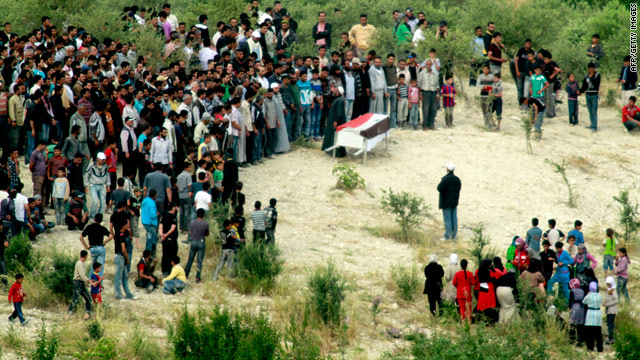Report: Military in control of Syrian city

- Syrian military controls Jisr Al-Shugur, rights groups and government say
- Opposition members question government report of "mass grave"
- U.K. foreign secretary: Many have fled the "military offensive" in Jisr al-Shugur
- U.N. chief: "The use of military force against civilians is unacceptable"
(CNN) -- The Syrian military controls Jisr Al-Shugur after entering the northwestern city over the weekend, a network of human rights activists said Monday.
The Local Coordination Committees of Syria said Syrian soldiers were going house-to-house carrying out searches. No new explosions, casualties or detentions were reported Monday.
The Syrian government gave a similar assessment. "Army units on Monday restored security and tranquility to the city of Jisr Al-Shugur," state-run news agency SANA reported.
The Syrian border city has taken on a pivotal role in the conflict, with fighting and deaths -- and competing narratives about what had happened.
The Syrian government insists it is stopping "armed terrorist groups" who carried out a "massacre" in the city; opposition activists say the government's claims are a ruse to justify a crackdown on demonstrators looking for government reform, in keeping with the wave of political protests across the Middle East and North Africa.
Throughout Syria's uprising, its government has described activist leaders as terrorists looking to destabilize the country. This month, the government said 120 members of the security forces had been killed by "armed groups" in Jisr Al-Shugur.
 Refugees stream into Turkey
Refugees stream into Turkey
 Syrians flee bullets near Turkish border
Syrians flee bullets near Turkish border
 Syrians tell of harrowing escapes
Syrians tell of harrowing escapes
 Activists: Syria violating human rights
Activists: Syria violating human rights
Syrian opposition members, including human rights activist Wissam Tarif, said the deaths likely stemmed from a rift within security forces.
Some Syrian refugees who have since fled to Turkey said some Syrian soldiers rebelled after being ordered to fire on unarmed protesters and instead started fighting among themselves.
Amr Al Azm, a Syrian dissident and associate professor at Shawnee State University in Ohio, said Jisr Al-Shugur shows that a split within the military has the potential to widen.
The government and opposition activists have told different stories of an alleged "mass grave."
State TV said Sunday authorities in the city had found a "mass grave" containing decapitated and mutilated bodies of members of security forces killed by "armed gangs." SANA said there were 12 bodies.
Video on state TV showed bodies at the site though their conditions were not discernible.
SANA said Monday that state TV had "broadcast the confession of the "terrorist," Anwar Nafe al-Dosh, a member of armed terrorist groups in Jisr Al-Shugur, who described the "massacre committed against the police and security forces."
The report quoted al-Dosh as naming the "masterminds" of the "massacre" and saying they had beheaded 10 members of the security forces in what they called a "bloodbath for freedom."
Some members of the opposition questioned the government's report on the purported mass grave.
Fadi, an activist from Jisr Al-Shugur who has been traveling between the city and a makeshift camp near the Syrian border, said the Syrian army dug a hole two weeks ago outside Jisr Al-Shugur and dumped the bodies of prisoners into it the next day.
Tarif, head of the human rights group INSAN, questioned the accuracy of the government report. He said he had information that two army units had clashed, leading to numerous deaths.
But an activist based outside of Syria who has an extensive network inside the country, said he believed state TV's version of events.
CNN has been unable to independently confirm accounts of the unrest in Syria, because the Syrian government has not granted the network access to the country.
At least three people were killed Sunday in clashes, state media reported. One Syrian soldier was killed and four other soldiers were wounded in the fighting, Syrian state television reported Sunday. SANA said two gunmen were killed and "many others" were arrested.
State television said Sunday that military units had entered Jisr Al-Shugur to "cleanse the national hospital from the elements of the armed gangs after disabling the explosives and the various TNT devices that these gangs planted on the bridges and roads."
World leaders, meanwhile, have been mounting pressure on Syria to halt the violence against protesters seeking government reform.
In a statement Sunday, U.N. Secretary-General Ban Ki-moon condemned Syria's use of force against civilians and expressed particular concern about violence in Jisr Al-Shugur.
"The Syrian authorities have an obligation to protect their people and respect their rights. The use of military force against civilians is unacceptable," the U.N. statement said.
Metin Corabatir of the UNHCR office in Ankara said that the number of Syrian refugees crossing into Turkey was 6,817 as of Monday morning.
"The border crossings continue throughout the day," Corabatir said.
A fourth refugee camp was set up Sunday in Hamza Cisligi, about 100 meters (109 yards) from the Syrian border in Turkey, to take in Syrians who have fled the regime's crackdown.
Amnesty International said last week it believes more than 1,100 people -- including 82 children -- have been killed in Syria since the crackdown started in mid-March.
CNN's Arwa Damon, Salma Abdelaziz and Saad Abedine contributed to this report.
